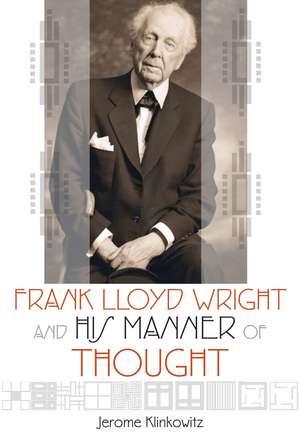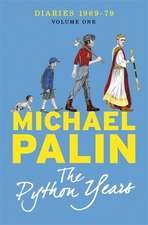Frank Lloyd Wright and His Manner of Thought
Autor Jerome Klinkowitzen Limba Engleză Paperback – 18 sep 2014
An iconic figure in American culture, Frank Lloyd Wright is famous throughout the world. Although his achievements in architecture are stunning, it is his importance in cultural history, Jerome Klinkowitz contends, that makes Wright the object of such avid and continuing interest. Designing more than just buildings, Wright offered a concept for living that still influences how people conduct their lives today. Wright's innovations in architecture have been widely studied, but this is the most comprehensive and sustained treatment of his thought.
Klinkowitz presents a critical biography driven by the architect's own work and intellectual growth, focusing on the evolution of Wright's thinking and writings from his first public addresses in 1894 to his last essay in 1959. Did Wright reject all of Victorian thinking about the home, or do his attentions to a minister's sermon on "the house beautiful" deserve closer attention? Was Wright echoing the Transcendentalism of Ralph Waldo Emerson, or was he more in step with the philosophy of William James? Did he reject the Arts and Crafts movement, or repurpose its beliefs and practices for new times? And, what can be said of his deep dissatisfaction with architectural concepts of his own era, the dominant modernism that became the International Style? Even the strongest advocates of Frank Lloyd Wright have been puzzled by his objections to so much that characterized the twentieth century, from ideas for building to styles of living.
In Frank Lloyd Wright and His Manner of Thought, Klinkowitz, a widely published authority on twentieth-century literature, thought, and culture, examines the full extent of Wright's books, essays, and lectures to show how he emerged from the nineteenth century to anticipate the twenty-first.
Outstanding Book, selected by the American Association of School Librarians
Best Books for General Audiences, selected by the Public Library Reviewers
Klinkowitz presents a critical biography driven by the architect's own work and intellectual growth, focusing on the evolution of Wright's thinking and writings from his first public addresses in 1894 to his last essay in 1959. Did Wright reject all of Victorian thinking about the home, or do his attentions to a minister's sermon on "the house beautiful" deserve closer attention? Was Wright echoing the Transcendentalism of Ralph Waldo Emerson, or was he more in step with the philosophy of William James? Did he reject the Arts and Crafts movement, or repurpose its beliefs and practices for new times? And, what can be said of his deep dissatisfaction with architectural concepts of his own era, the dominant modernism that became the International Style? Even the strongest advocates of Frank Lloyd Wright have been puzzled by his objections to so much that characterized the twentieth century, from ideas for building to styles of living.
In Frank Lloyd Wright and His Manner of Thought, Klinkowitz, a widely published authority on twentieth-century literature, thought, and culture, examines the full extent of Wright's books, essays, and lectures to show how he emerged from the nineteenth century to anticipate the twenty-first.
Outstanding Book, selected by the American Association of School Librarians
Best Books for General Audiences, selected by the Public Library Reviewers
Preț: 171.60 lei
Nou
Puncte Express: 257
Preț estimativ în valută:
32.84€ • 34.16$ • 27.11£
32.84€ • 34.16$ • 27.11£
Carte tipărită la comandă
Livrare economică 15-29 aprilie
Preluare comenzi: 021 569.72.76
Specificații
ISBN-13: 9780299301446
ISBN-10: 0299301443
Pagini: 208
Dimensiuni: 152 x 229 x 18 mm
Greutate: 0.3 kg
Ediția:1
Editura: University of Wisconsin Press
Colecția University of Wisconsin Press
ISBN-10: 0299301443
Pagini: 208
Dimensiuni: 152 x 229 x 18 mm
Greutate: 0.3 kg
Ediția:1
Editura: University of Wisconsin Press
Colecția University of Wisconsin Press
Recenzii
"As Klinkowitz shows, Wright’s thought is deeply visionary. It deploys its challenging truths against an ossified present, in the name of a spatial philosophy critical of both pre-modern ornamentalism and of modernism’s standardization and keen, instead, on the values of fluidity, eco-architectural, organic integration, cross-culturally allusive and decentered design, inside-outside unity, and democratic geometry."—Christian Moraru, University of North Carolina at Greensboro
“The complexity of [Wright’s] thinking, both as an architect and as a philosopher of the aesthetic, was astounding, and Klinkowitz has done a splendid job of tracing these multiple byways and illuminating the final achievements. . . . A notable contribution to both architectural and cultural history.”—Library Journal
“That Frank Lloyd Wright was his own greatest creation is a truism rendered all the more defensible with this critique of the architect’s collected writings. . . . [Klinkowitz] engages the buildings of this design genius—not as products of mere biographical or historical happenstance, but through penetrating analyses of the compositions themselves . . . demonstrating that, whether expressing himself in concrete or abstract terms, Wright was the most principle architect-philosopher of modern times. Recommended; general readers and lower-level undergraduates and above.”—Choice
“[This] is not a retelling of a history we already know. . . . It is not just a book about architecture but about [Wright’s] manner of thought and the way it influenced, or has been influenced by, American culture. . . . It offers new and exciting insights.”—Journal of the Taliesin Fellows
“Exactly what is needed to examine the popular architect and societal figure from a completely new perspective. . . . Engaging, informative, and thought-provoking.”—American Studies
Notă biografică
Jerome Klinkowitz is a University Distinguished Scholar and professor of English at the University of Northern Iowa. He is the author and editor of many books, including four editions of The Norton Anthology of American Literature.
Cuprins
Preface
Introduction: Truth against the World
1 Architects and Machines
2 The Prairie and the World
3 Japan and After
4 An Autobiography and the Fellowship
5 Broadacre City and the 1930s
Conclusion: A Second Career
Appendix: Divorce Papers of William C. and Anna L. Wright
Bibliography of Works Consulted
Index
Introduction: Truth against the World
1 Architects and Machines
2 The Prairie and the World
3 Japan and After
4 An Autobiography and the Fellowship
5 Broadacre City and the 1930s
Conclusion: A Second Career
Appendix: Divorce Papers of William C. and Anna L. Wright
Bibliography of Works Consulted
Index
Descriere
A fresh assessment of Wright focusing on the evolution of his thinking and writings from the 1890s to the 1950s, showing how his ideas for living emerged from the nineteenth century to anticipate the twenty-first.








